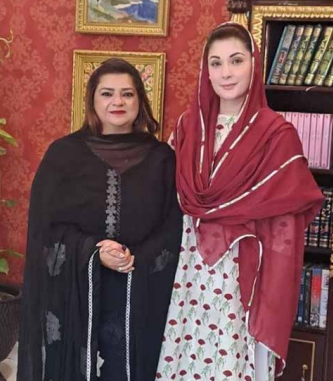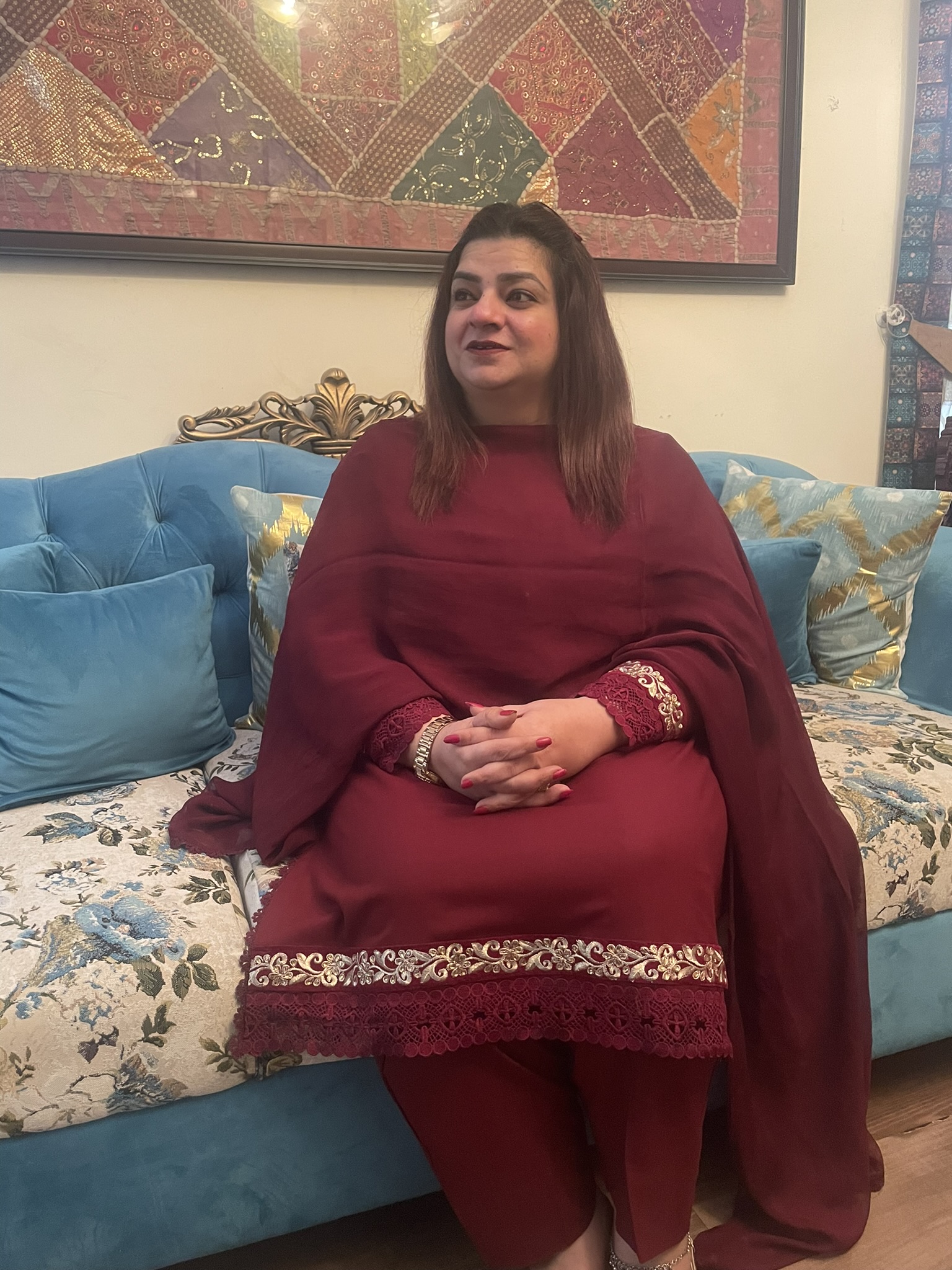Raheela Khadim Hussain is a well-known name in PML-N cadres. As an advocate for minority rights and a seasoned politician, Raheela shares insights into her experiences, aspirations, and the transformative role she envisions for PML-N in the upcoming general election. Currently, she serves as the organiser of the party’s Minority Wing.
Horizon: What was your inspiration to enter politics?
RKH: My primary inspiration was my mother, Begum Sardar Khadim Hussain, a dedicated political worker. Despite being the third among siblings, my father chose me to succeed my mother due to my involvement in student politics and speechwriting for her during college. I’m grateful that my husband supported my career. Although my mother offered me a gateway into politics, I worked tirelessly to forge my own path in the field.
Horizon: What difficulties did you face in your political journey?
RKH: Contesting the 2005 local body elections amid Musharraf’s regime was a significant challenge. As the only woman in Lahore vying for the Union Council Nazim seat under PML-N, I encountered intense pressure to stand down which also affected my family. After all the manipulations, I was defeated by just 200 votes. Despite this setback, I continued my work, entering the Punjab Assembly as a parliamentarian in 2008 on a reserved seat for women until 2023. As a legislator, I focused on development programmes and legislative initiatives for women’s empowerment, especially from 2013-2018 under the leadership of Mian Shehbaz Sharif, who did groundbreaking work to empower women.
Horizon: Tell us about your work in the Minority Wing.
RKH: Having recently been appointed as the organiser of the Minority Wing, I took on the challenge of uniting a previously divided organisation. In just five months, our team has grown from 70-75 members to 32,000 in Punjab. We’re dedicated to addressing the concerns of minority communities and have incorporated their recommendations into PML-N’s election manifesto.
Horizon: What are the main concerns of Pakistan’s minorities, and what recommendations have they given for PML-N’s election manifesto?
RKH: The major concerns of minority communities include security, economic empowerment of women, and the absence of youth development centres. We collaborated with various stakeholders to formulate practical solutions and integrated them into our party manifesto to foster the development of all religious communities in Pakistan.

Horizon: You have served as chairperson of the Gender Mainstreaming Committee of the Punjab Assembly from 2013 to 2018. How was your experience?
RKH: Mian Shehbaz Sharif decided to establish an independent Gender Mainstreaming Committee in the Punjab Assembly in line with global trends and appointed me its first chairperson. As a new committee, initially, we had to work very hard. All gender-related legislation and reports were sent to us for our input. Working closely with civil society, I played an active role in pro-women legislation in Punjab. Through our work we let the world know that we are serious about protecting women’s rights.
Horizon: There is a widespread perception that reserved seats are used to reward people rather than upholding merit. Is this impression correct?
RKH: Yes, I pretty much agree with that. In all the political parties of Pakistan, the quota of reserved seats is used to favour people to some extent. However, women in reserved seats actively contribute, though their work may go unnoticed due to the lack of a direct constituency. I wrote a letter to Parliament and the Election Commission to remedy this. I propose a solution where women contesting elections on reserved seats should have a separate ballot paper along with the MNAs and MPAs, enabling them to represent a constituency directly.
Horizon: How was your experience as an opposition member in the Punjab Assembly from 2018 to 2022?
RKH: We saw the quality of governance in Punjab decline. When we visited the Punjab Commission on the Status of Women, we saw the building was not maintained, the staff hadn’t received their salaries, and a chair had not been appointed in three years. The PTI government let the women’s crisis centre in Multan decline as well. Similarly, the PTI government failed to control dengue. Various scholarship schemes for students were closed and work on sports complexes started during the PML-N tenure was shut down. During this time, Hamza Shahbaz showed leadership by keeping in contact with members and addressing their issues.

Horizon: Were members harassed during this time?
RKH: It was a challenging time. PML-N members’ houses were raided, and false cases were registered against us with the police. We were psychologically attacked by repeatedly being told that Mian Nawaz Sharif’s political career was over. During the election of the speaker, deputy speaker, and chief minister, our members were offered incentives or threatened. Despite the adversity, our members remained loyal and we refrained from inciting violence.
Horizon: You are an eyewitness to the incident of 9 May. Tell us something about that day.
RKH: I reside in Lahore Cantt. At the time of the attack on Jinnah House on 9 May, I was driving home along the same road. I witnessed PTI workers carrying their party’s flags attacking Jinnah House. These rioters were chanting anti-Pakistan slogans that I find too reprehensible to repeat. As a political activist, I am bewildered by PTI’s approach to politics. The constant indoctrination of the youth and citizens by PTI leaders incited them to attack the very country they aspire to govern.
Horizon: Regarding the character assassination of politicians, what is your opinion and proposed solution?
RKH: Character assassination of politicians has been prevalent since the martial law era of the 1980s, with politicians being the most maligned group on social media today. I believe that everyone has a role to play in statecraft including the establishment, politicians, judiciary, and media. No one pillar of the state can run the country on its own. The solution lies in greater transparency and independence of the Election Commission and Parliament.
Horizon: How do you balance family life and politics?
RKH: I have four children, one married, and the other three pursuing university studies. My mother, a political worker, imparted political training to me since childhood. I followed the same pattern in training my children. One thing is certain, I participate in my political activities only because of my family’s support. My husband in particular has always remained supportive.
Horizon: What are your hobbies?
RKH: I enjoy reading Mustansar Hussain Tarar’s travelogues and listening to old singers like Lata, Diljit, Rafi, Kishore Kumar, and Nusrat Fateh Ali Khan’s Qawwali.
Horizon: How do you envision PML-N’s position in the upcoming general election?
RKH: Many strong candidates have applied for the PML-N tickets and the PML-N Parliamentary Board has completed comprehensive interviews of all the candidates division-wise. Without a doubt, the best candidates will be fielded. Insha’Allah, PML-N will secure a clear advantage in the 2024 general election and steer Pakistan back on the path of development.
Horizon: Thank you very much for your time.
RKH: The pleasure is mine.








